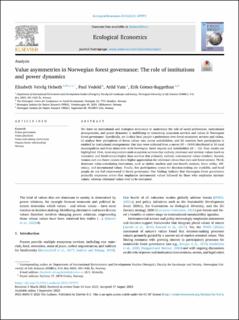Value asymmetries in Norwegian forest governance: The role of institutions and power dynamics
Peer reviewed, Journal article
Published version

Åpne
Permanent lenke
https://hdl.handle.net/11250/3111339Utgivelsesdato
2023Metadata
Vis full innførselSamlinger
- Publikasjoner fra CRIStin - NINA [2364]
- Scientific publications [1392]
Sammendrag
We draw on institutional and ecological economics to understand the role of social preferences, institutional arrangements, and power dynamics in mobilizing or restraining ecosystem services and values in Norwegian forest governance. Specifically, we
i) elicit local people’s preferences over forest ecosystem services and values,
ii) analyze how perceptions of forest values vary across stakeholders, and
iii) examine how participation is enabled by institutional arrangements. Our data were collected from a survey (N = 1694) distributed in 10 rural municipalities and from interviews with Norwegian forest experts and stakeholders (N = 15). Four results are highlighted. First, most respondents rank ecosystem services that embody relational and intrinsic values (such as recreation and biodiversity) higher than services that primarily embody instrumental values (timber). Second, women and non-forest owners show higher appreciation for relational values than men and forest owners. Third, dominant value-articulating institutions, such as timber markets and cost-benefit analysis, favor utility, efficiency, and instrumental values. Finally, few participatory arenas for decision-making are available, and local
people do not feel empowered in forest governance. Our findings indicate that Norwegian forest governance primarily empowers actors that emphasize instrumental values followed by those who emphasize intrinsic values, whereas relational values tend to be restrained.
